译作赏析培根论婚姻
论结婚与独身
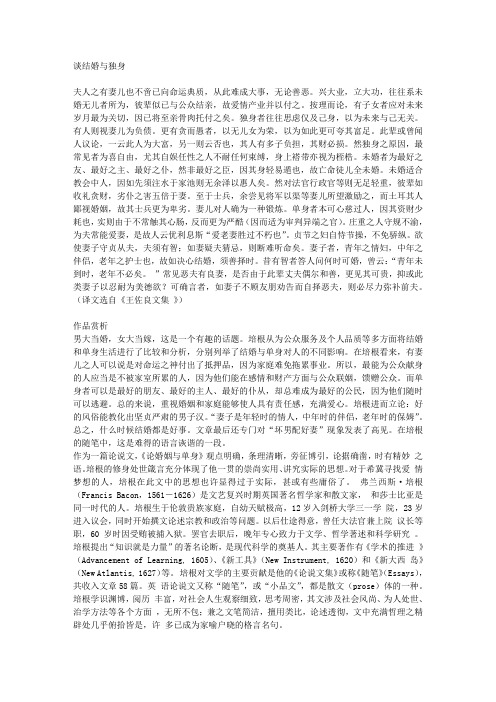
谈结婚与独身夫人之有妻儿也不啻已向命运典质,从此难成大事,无论善恶。
兴大业,立大功,往往系未婚无儿者所为,彼辈似已与公众结亲,故爱情产业并以付之。
按理而论,有子女者应对未来岁月最为关切,因已将至亲骨肉托付之矣。
独身者往往思虑仅及己身,以为未来与己无关。
有人则视妻儿为负债。
更有贪而愚者,以无儿女为荣,以为如此更可夸其富足。
此辈或曾闻人议论,一云此人为大富,另一则云否也,其人有多子负担,其财必损。
然独身之原因,最常见者为喜自由,尤其自娱任性之人不耐任何束缚,身上褡带亦视为桎梏。
未婚者为最好之友、最好之主、最好之仆,然非最好之臣,因其身轻易遁也,故亡命徒儿全未婚。
未婚适合教会中人,因如先须注水于家池则无余泽以惠人矣。
然对法官行政官等则无足轻重,彼辈如收礼贪财,劣仆之害五倍于妻。
至于士兵,余尝见将军以渠等妻儿所望激励之,而土耳其人鄙视婚姻,故其士兵更为卑劣。
妻儿对人确为一种锻炼。
单身者本可心慈过人,因其资财少耗也,实则由于不常触其心肠,反而更为严酷(因而适为审判异端之官)。
庄重之人守规不渝,为夫常能爱妻,是故人云优利息斯“爱老妻胜过不朽也”。
贞节之妇自恃节操,不免骄纵。
欲使妻子守贞从夫,夫须有智;如妻疑夫猜忌,则断难听命矣。
妻子者,青年之情妇,中年之伴侣,老年之护士也,故如决心结婚,须善择时。
昔有智者答人问何时可婚,曾云:“青年未到时,老年不必矣。
”常见恶夫有良妻,是否由于此辈丈夫偶尔和善,更见其可贵,抑或此类妻子以忍耐为美德欲?可确言者,如妻子不顾友朋劝告而自择恶夫,则必尽力弥补前夫。
(译文选自《王佐良文集》)作品赏析男大当婚,女大当嫁,这是一个有趣的话题。
培根从为公众服务及个人品质等多方面将结婚和单身生活进行了比较和分析,分别列举了结婚与单身对人的不同影响。
在培根看来,有妻儿之人可以说是对命运之神付出了抵押品,因为家庭难免拖累事业。
所以,最能为公众献身的人应当是不被家室所累的人,因为他们能在感情和财产方面与公众联姻,馈赠公众。
论婚姻
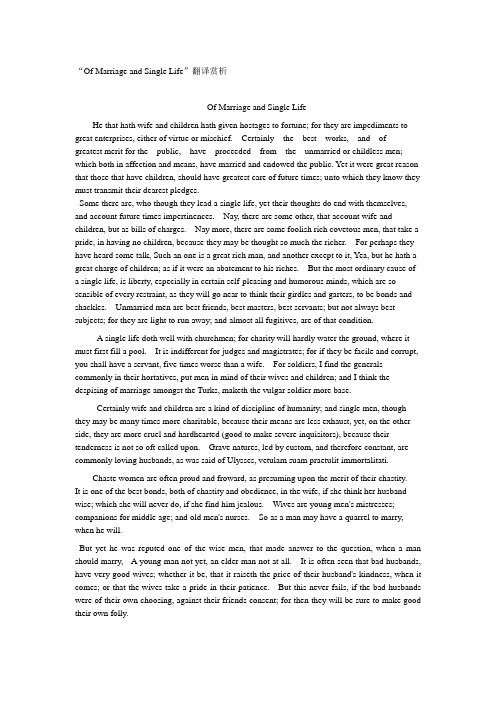
“Of Marriage and Single Life”翻译赏析Of Marriage and Single LifeHe that hath wife and children hath given hostages to fortune; for they are impediments to great enterprises, either of virtue or mischief. Certainly the best works, and of greatest merit for the public, have proceeded from the unmarried or childless men; which both in affection and means, have married and endowed the public. Yet it were great reason that those that have children, should have greatest care of future times; unto which they know they must transmit their dearest pledges.Some there are, who though they lead a single life, yet their thoughts do end with themselves, and account future times impertinences. Nay, there are some other, that account wife and children, but as bills of charges. Nay more, there are some foolish rich covetous men, that take a pride, in having no children, because they may be thought so much the richer. For perhaps they have heard some talk, Such an one is a great rich man, and another except to it, Yea, but he hath a great charge of children; as if it were an abatement to his riches. But the most ordinary cause of a single life, is liberty, especially in certain self-pleasing and humorous minds, which are so sensible of every restraint, as they will go near to think their girdles and garters, to be bonds and shackles. Unmarried men are best friends, best masters, best servants; but not always best subjects; for they are light to run away; and almost all fugitives, are of that condition.A single life doth well with churchmen; for charity will hardly water the ground, where it must first fill a pool. It is indifferent for judges and magistrates; for if they be facile and corrupt, you shall have a servant, five times worse than a wife. For soldiers, I find the generals commonly in their hortatives, put men in mind of their wives and children; and I think the despising of marriage amongst the Turks, maketh the vulgar soldier more base.Certainly wife and children are a kind of discipline of humanity; and single men, though they may be many times more charitable, because their means are less exhaust, yet, on the other side, they are more cruel and hardhearted (good to make severe inquisitors), because their tenderness is not so oft called upon. Grave natures, led by custom, and therefore constant, are commonly loving husbands, as was said of Ulysses, vetulam suam praetulit immortalitati.Chaste women are often proud and froward, as presuming upon the merit of their chastity.It is one of the best bonds, both of chastity and obedience, in the wife, if she think her husband wise; which she will never do, if she find him jealous. Wives are young men's mistresses; companions for middle age; and old men's nurses. So as a man may have a quarrel to marry, when he will.But yet he was reputed one of the wise men, that made answer to the question, when a man should marry, - A young man not yet, an elder man not at all. It is often seen that bad husbands, have very good wives; whether it be, that it raiseth the price of their husband's kindness, when it comes; or that the wives take a pride in their patience. But this never fails, if the bad husbands were of their own choosing, against their friends consent; for then they will be sure to make good their own folly.译文:成了家的人,可以说对命运之神付出了抵押品。
培根-论爱情论婚姻
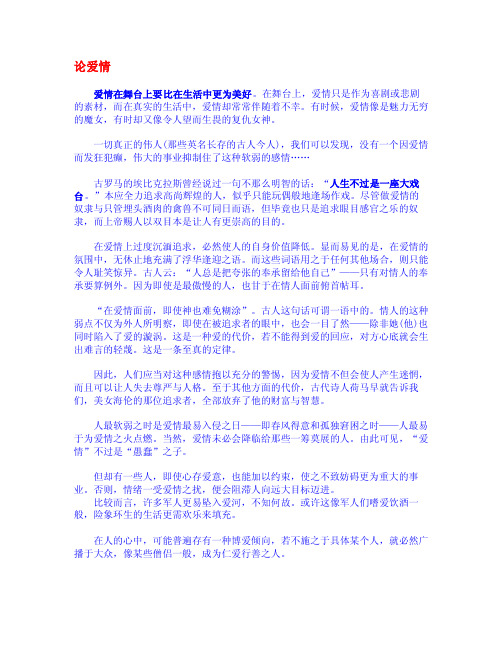
论爱情爱情在舞台上要比在生活中更为美好。
在舞台上,爱情只是作为喜剧或悲剧的素材,而在真实的生活中,爱情却常常伴随着不幸。
有时候,爱情像是魅力无穷的魔女,有时却又像令人望而生畏的复仇女神。
一切真正的伟人(那些英名长存的古人今人),我们可以发现,没有一个因爱情而发狂犯癫,伟大的事业抑制住了这种软弱的感情……古罗马的埃比克拉斯曾经说过一句不那么明智的话:“人生不过是一座大戏台。
”本应全力追求高尚辉煌的人,似乎只能玩偶般地逢场作戏。
尽管做爱情的奴隶与只管埋头酒肉的禽兽不可同日而语,但毕竟也只是追求眼目感官之乐的奴隶,而上帝赐人以双目本是让人有更崇高的目的。
在爱情上过度沉湎追求,必然使人的自身价值降低。
显而易见的是,在爱情的氛围中,无休止地充满了浮华逢迎之语。
而这些词语用之于任何其他场合,则只能令人耻笑惊异。
古人云:“人总是把夸张的奉承留给他自己”——只有对情人的奉承要算例外。
因为即使是最傲慢的人,也甘于在情人面前俯首帖耳。
“在爱情面前,即使神也难免糊涂”。
古人这句话可谓一语中的。
情人的这种弱点不仅为外人所明察,即使在被追求者的眼中,也会一目了然——除非她(他)也同时陷入了爱的漩涡。
这是一种爱的代价,若不能得到爱的回应,对方心底就会生出难言的轻蔑。
这是一条至真的定律。
因此,人们应当对这种感情抱以充分的警惕,因为爱情不但会使人产生迷惘,而且可以让人失去尊严与人格。
至于其他方面的代价,古代诗人荷马早就告诉我们,美女海伦的那位追求者,全部放弃了他的财富与智慧。
人最软弱之时是爱情最易入侵之日——即春风得意和孤独窘困之时——人最易于为爱情之火点燃。
当然,爱情未必会降临给那些一筹莫展的人。
由此可见,“爱情”不过是“愚蠢”之子。
但却有一些人,即使心存爱意,也能加以约束,使之不致妨碍更为重大的事业。
否则,情绪一受爱情之扰,便会阻滞人向远大目标迈进。
比较而言,许多军人更易坠入爱河,不知何故。
或许这像军人们嗜爱饮酒一般,险象环生的生活更需欢乐来填充。
译作赏析培根论婚姻

Of Marriage and Single LifeFrancis BaconHe that hath wife and children hath given hostages to fortune; for they are impediments to great enterprises, either of virtue or mischief. Certainly the best works, and of greatest merit for the public, have proceeded from the unmarried or childless men; which both in affection and means, have married and endowed the public. Yet it were great reason that those that have children, should have greatest care of future times; unto which they know they must transmit their dearest pledges.Some there are, who though they lead a single life, yet their thoughts do end with themselves, and account future times impertinences. Nay, there are some other, that account wife and children, but as bills of charges. Nay more, there are some foolish rich covetous men that take a pride, in having no children, because they may be thought so much the richer. For perhaps they have heard some talk, “Such an one is a great rich man”, and another except to it, “Yea, but he hath a great charge of children”; as if it were an abatement to his riches. But the most ordinary cause of a single life, is liberty, especially in certain self-pleasing and humorous minds, which are so sensible of every restraint, as they will go near to think their girdles and garters, to be bonds and shackles. Unmarried men are best friends, best masters, best servants; but not always best subjects; for they are light to run away; and almost all fugitives, are of that condition.A single life doth well with churchmen; for charity will hardly water the ground, where it must first fill a pool. It is indifferent for judges and magistrates; for if they be facile and corrupt, you shall have a servant, five times worse than a wife. For soldiers, I find the generals commonly in their hortatives, put men in mind of their wives and children; and I think the despising of marriage amongst the Turks, maketh the vulgar soldier more base.Certainly wife and children are a kind of discipline of humanity; and single men, though they may be many times more charitable, because their means are less exhaust, yet, on the other side, they are more cruel and hardhearted (good to make severe inquisitors), because their tenderness is not so oft called upon. Grave natures, led by custom, and therefore constant, are commonly loving husbands, as was said of Ulysses, vetulam suam praetulit immortalitati.Chaste women are often proud and froward, as presuming upon the merit of their chastity. It is one of the best bonds, both of chastity and obedience, in the wife, if she think her husband wise; which she will never do, if she find him jealous. Wives are young men's mistresses; companions for middle age; and old men's nurses. So as a man may have a quarrel to marry, when he will.But yet he was reputed one of the wise men, that made answer to the question, when a man should marry, - A young man not yet, an elder man not at all. It is often seen that bad husbands, have very good wives; whether it be, that it raiseth the price of their husband's kindness, when it comes; or that the wives take a pride in their patience. But this never fails, if the bad husbands were of their own choosing, against their friends consent; for then they will be sure to make good their own folly. 论结婚与独身(水天同译)有妻与子的人已经向命运之神交了抵押品了;因为妻与子是大事底阻挠物,无论是大善举或大恶行。
译论婚姻与独身
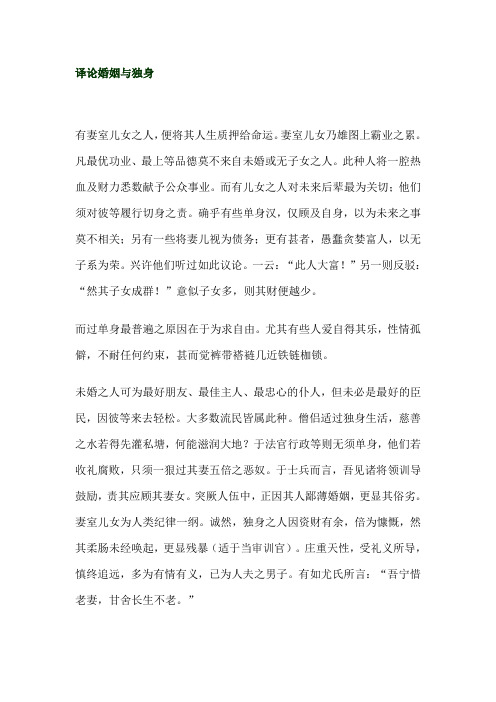
译论婚姻与独身有妻室儿女之人,便将其人生质押给命运。
妻室儿女乃雄图上霸业之累。
凡最优功业、最上等品德莫不来自未婚或无子女之人。
此种人将一腔热血及财力悉数献予公众事业。
而有儿女之人对未来后辈最为关切;他们须对彼等履行切身之责。
确乎有些单身汉,仅顾及自身,以为未来之事莫不相关;另有一些将妻儿视为债务;更有甚者,愚蠢贪婪富人,以无子系为荣。
兴许他们听过如此议论。
一云:“此人大富!”另一则反驳:“然其子女成群!”意似子女多,则其财便越少。
而过单身最普遍之原因在于为求自由。
尤其有些人爱自得其乐,性情孤僻,不耐任何约束,甚而觉裤带褡裢几近铁链枷锁。
未婚之人可为最好朋友、最佳主人、最忠心的仆人,但未必是最好的臣民,因彼等来去轻松。
大多数流民皆属此种。
僧侣适过独身生活,慈善之水若得先灌私塘,何能滋润大地?于法官行政等则无须单身,他们若收礼腐败,只须一狠过其妻五倍之恶奴。
于士兵而言,吾见诸将领训导鼓励,责其应顾其妻女。
突厥人伍中,正因其人鄙薄婚姻,更显其俗劣。
妻室儿女为人类纪律一纲。
诚然,独身之人因资财有余,倍为慷慨,然其柔肠未经唤起,更显残暴(适于当审训官)。
庄重天性,受礼义所导,慎终追远,多为有情有义,已为人夫之男子。
有如尤氏所言:“吾宁惜老妻,甘舍长生不老。
”操节之妇多引此自傲简慢。
觉其丈夫英明伟烈之女,必坚守节操,且言行不违;而若其察夫妒意甚盛,则断不然听从。
妻乃少年之情人,中年伴侣,老年侍护。
男子兴许为何时为婚,意见不一,然能择时而娶,则为明智之士。
年齿太幼不宜,过老则不必。
常见顽劣男子得配极佳女子,其缘由或为丈夫偶施柔情,则倍为感恩;或自得于己之忍耐美德。
如若此夫为已所选,且为其友人所非,则只能逆来顺受。
因其必得坦然承担自己择人之失。
这篇散文是培根(Francis Bacon 1561-1626)所做,即那个说‘知识就是力量’的家伙。
与莎翁同时代人,可以说,实证主义传统及海派的empiricism(实用主义)的奠基人。
经典散文翻译赏析:培根《论婚姻与独身》
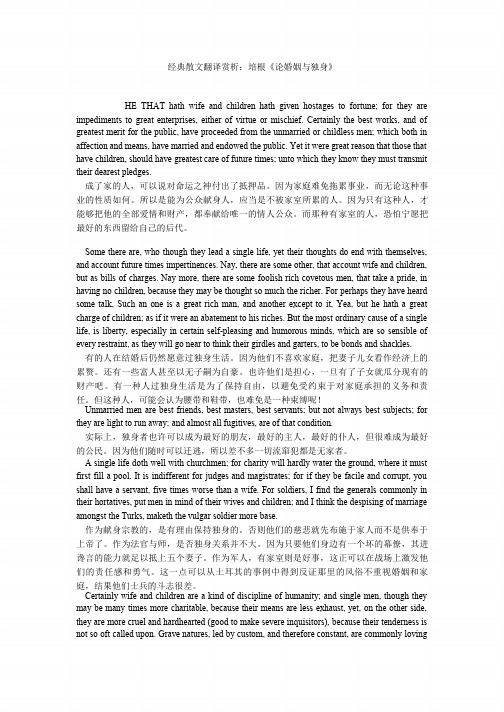
husbands, as was said of Ulysses, vetulam suam praetulit immortalitati. 对家庭的责任心不仅是人类的一种约束,也是一种训练。那种独身的人,虽然在用起来
似很慷慨,但实际上往往是心肠很硬的,因为他们不懂得对他人的爱。 一种好的风俗,能 教化出情感坚贞的男子汉,例如像优里西斯(Ulysses)那样,他曾抵制美丽女神的诱惑,而 保持了对妻子的忠贞。
成了家的人,可以说对命运之神付出了抵押品。因为家庭难免拖累事业,而无论这种事 业的性质如何。所以是能为公众献身人,应当是不被家室所累的人。因为只有这种人,才 能够把他的全部爱情和财产,都奉献给唯一的情人公众。而那种有家室的人,恐怕宁愿把 最好的东西留给自己的后代。
Some there are, who though they lead a single life, yet their thoughts do end with themselves, and account future times impertinences. Nay, there are some other, that account wife and children, but as bills of charges. Nay more, there are some foolish rich covetous men, that take a pride, in having no children, because they may be thought so much the richer. For perhaps they have heard some talk, Such an one is a great rich man, and another except to it, Yea, but he hath a great charge of children; as if it were an abatement to his riches. But the most ordinary cause of a single life, is liberty, especially in certain self-pleasing and humorous minds, which are so sensible of every restraint, as they will go near to think their girdles and garters, to be bonds and shackles.
培根关于婚姻的观点的名言解析英文版
培根关于婚姻的观点的名言解析英文版Francis Bacon, a renowned English philosopher and statesman, had profound insights into various aspects of life, including marriage. In this analysis, we will delve into some of Bacon's notable quotes on marriage and unravel the wisdom and perspectives hidden within them.One of Bacon's famous quotes on marriage is, "He that hath wife and children hath given hostages to fortune; for they are impediments to great enterprises, either of virtue or mischief." This quote reflects Bacon's belief that marriage and family responsibilities can be both a source of strength and a hindrance to one's ambitions. By using the term "hostages to fortune," Bacon suggests that having a spouse and children can tie one down and limit their freedom to pursue grand endeavors. However, he also acknowledges that family can provide stability and motivation for individuals to strive for excellence intheir endeavors.Another insightful quote by Bacon is, "It is a strange desire, to seek power and to lose liberty; or to seek power over others and to lose power over a man's self." In this quote, Bacon highlights the paradoxical nature of seeking power and control in relationships. He warns against the temptation to dominate others, as it may lead to a loss of personal autonomy and self-control. Bacon emphasizes the importance of maintaining a balance between asserting authority and preserving one's own freedom and integrity in marriage and other relationships.Bacon also remarked, "Marriage is the mother of the world, and preserves kingdoms, and fills cities, and churches, and heaven itself." This quote underscores the significance of marriage as a foundational institution that sustains societies and fosters growth and prosperity. Bacon recognizes the pivotal role of marriage in shaping the fabric of civilization and perpetuating human existence through the creation of families and communities. He views marriage not only as a personal union but also as a cornerstone of social order and continuity.In his quote, "Certainly the best works, and ofgreatest merit for the public, have proceeded from the unmarried or childless men; which both in affection and means, have married and endowed the public." Bacon acknowledges the contributions of individuals who remain unmarried or childless in dedicating themselves to public service and philanthropy. He suggests that those unencumbered by family obligations may have greater freedom to pursue noble causes and advance the common good. However, Bacon also recognizes the value of marriage in fostering a sense of responsibility and commitment to the welfare of society.Lastly, Bacon observed, "In the youth of a state, arms do flourish; in the middle age of a state, learning; and then both of them together for a time; in the declining age of a state, mechanical arts and merchandise." This quote reflects Bacon's broader perspective on the evolution of societies and the shifting priorities and values across different stages of development. While not explicitly about marriage, this quote underscores the dynamic nature of human societies and the interplay of various factors,including marriage, in shaping the trajectory of civilizations.In conclusion, Francis Bacon's reflections on marriage offer profound insights into the complexities and nuances of human relationships and societal dynamics. His quotes encapsulate timeless truths about the challenges and rewards of marriage, the balance between personal freedom and social responsibilities, and the enduring significance of family in the fabric of society. By unraveling Bacon's perspectives on marriage, we gain a deeper appreciation for the multifaceted nature of this fundamental institution in shaping individual lives and the course of history.。
培根论婚姻与独身读后感
培根论婚姻与独身读后感读培根谈婚姻与独身,就像听一个洞悉世事的老友在唠家常,可这家常里又藏着深刻的智慧。
先说婚姻吧。
培根说“妻子是青年时代的情人,中年时代的伴侣,暮年时代的守护。
”这可太形象了。
就像我看到身边那些恩爱的夫妻,年轻的时候,两个人看对方那眼睛里都冒星星,就跟罗密欧与朱丽叶似的,满是爱情的火花。
到了中年呢,就成了彼此生活里的左膀右臂。
男的可能在外面打拼事业,女的把家里操持得井井有条,两个人相互扶持着往前走。
等到老了啊,那就是彼此的依靠了。
生病的时候有个人在床边照顾着,端茶倒水,这种相伴到老的感觉,真的很让人羡慕。
不过呢,培根也提到婚姻里有一些麻烦事儿。
比如说,一个人一旦结了婚,那可就不能像单身的时候那么自由自在了。
我有个朋友就是,没结婚之前那是说走就走的旅行,各种潇洒。
结了婚之后呢,出门得先跟老婆报备,老婆不同意,他就只能乖乖在家。
而且有了家庭就有了责任,要考虑孩子的教育、家庭的经济状况等等。
这就像突然背上了一个重重的壳,虽然这个壳里也有温暖,但有时候也会让人觉得有点累。
再看独身。
独身的人在培根眼里,好像更加自由随性。
他们可以把所有的精力都放在自己想做的事情上。
像那些一心扑在科研上的科学家,或者追求艺术的画家、音乐家之类的,没有家庭的羁绊,他们就可以随心所欲地去探索自己的世界。
但是,独身也有不好的地方。
老了之后可能会比较孤独,没有家人在身边陪伴。
生病了也没人照顾,只能自己硬撑着。
而且,在社会上有时候还会被人另眼相看,好像不结婚就是不正常似的。
我觉得培根就像一个很公正的裁判,把婚姻和独身的优缺点都摆在我们面前。
他没有说哪个就一定好,哪个就一定不好。
这就跟我们现在的社会一样,每个人都有自己的选择。
有的人喜欢婚姻带来的那种温馨和归属感,哪怕要付出一些自由的代价。
而有的人就享受独身的自由,愿意独自面对生活中的酸甜苦辣。
总的来说,读了这篇文章,我对婚姻和独身有了更全面的认识。
就像打开了两扇不同的门,看到了门里面不同的风景和可能会遇到的坎坷。
译作赏析培根论婚姻
译作赏析培根论婚姻
婚姻是一种基本的人类机制,取决于我们的社会和文化关系的发展。
培根的论点是,婚姻应当识有基于忠诚的美德,每一方都应当遵守自己的婚姻承诺。
他把忠诚作为一种“契约”,把双方参与的责任视为美德。
培根表明,每一方在婚姻关系中都应当尽心尽力,去关心以及关注对方。
因此,培根将婚姻定义为一种具有忠诚性的关系,这种关系应该由彼此关心,体贴和
忠诚组成。
他认为,夫妻之间必须具有良好的沟通和理解,以保证他们相互之间的感情以
及自我实现的关注。
此外,培根也强调,婚姻本身就具有稳定的性质,应当严格遵守夫
妻双方及其家庭的权利义务。
最后,培根认为婚姻关系要建立在良好沟通和信赖基础之上,而夫妻之间的感情应当
健康而真挚,以实现彼此间最深刻的联系。
根据培根的观点,他认为婚姻的生命本应是一
种信任,忠诚和完美幸福的状态,夫妻之间也有责任平等地共同分享生活中的乐趣,撒播
爱意和温暖的情感。
综上所述,培根的论述强调了婚姻的忠诚性,尊重彼此的权利义务以及关心彼此的感情。
婚姻不仅要求双方忠诚而又要求双方建立一种有信任和互爱的关系。
有了这些基础,
婚姻关系才能够得以真正实现,并发展出更美好的生活现实。
爱情就是互相信赖、尊重、真诚相待——读培根《论爱情》
爱情就是互相信赖、尊重、真诚相待——读培根《论爱情》论爱情 / 培根舞台上的爱情⽐⽣活中的爱情要美好得多。
因为在舞台上,爱情只是喜剧和悲剧的素材,⽽在⼈⽣中,爱情却常常招来不幸。
它有时像那位诱惑⼈的魔⼥,有时⼜像那位复仇的⼥神。
你可以看到,⼀切真正伟⼤的⼈物(⽆论是古⼈、今⼈,只要是其英名永铭于⼈类记忆中的),没有⼀个是因爱情⽽发狂的⼈。
因为伟⼤的事业抑制了这种软弱的感情。
只有罗马的安东尼和克劳底亚是例外。
前者本性就好⾊荒淫,然⽽后者却是严肃多谋的⼈。
这说明爱情不仅会占领开旷坦阔的胸怀,有时也能闯⼊壁垒森严的⼼灵——假如守御不严的话。
埃辟克拉斯间说过⼀句笨话:“⼈⽣不过是⼀座⼤戏台。
”似乎本应努⼒追求⾼尚事业的⼈类,却只应像玩偶般地逢场作戏。
虽然爱情的奴⾪并不同于那班只顾吃喝的禽兽,但毕竟也只是眼⽬⾊相的奴⾪,⽽上帝赐⼈以眼睛本来是有更⾼尚的⽤途的。
过度的爱情追求,必然会降低⼈本⾝的价值。
例如,只有在爱情中,才总是需要那种浮夸谄媚的词令。
⽽在其它场合,同样的辞令只能招⼈耻笑。
古⼈有⼀句名⾔:“最⼤的奉承,⼈总是留给⾃⼰的。
”——只有对情⼈的奉承要算例外。
因为甚⾄最骄傲的⼈,也⽢愿在情⼈⾯前⾃轻⾃贱。
所以古⼈说得好:“就是神在爱情中也难保持聪明。
”情⼈的这种弱点不仅在外⼈眼中是明显的,就是在被追求者的眼中也会很明显——除⾮她(他)也在追求他(她)。
所以,爱情的代价就是如此,不能得到回爱,就会得到⼀种深藏于⼼的轻蔑,这是⼀条永真的定律。
由此可见,⼈们应当⼗分警惕这种感情。
因为它不但会使⼈丧失其他,⽽且可以使⼈丧失⾃⼰本⾝。
⾄于其他⽅⾯的损失,古诗⼈早就告诉我们,那追求海伦的⼈,是放弃了财富和智慧的。
当⼈⼼最软弱的时候,爱情最容易⼊侵,那就是当⼈春风得意、忘乎所以和处境窘困孤独凄零的时候,虽然后者未必能得到爱情。
⼈在这样的时候,最急于跳⼊爱情的⽕焰中。
由此可见,“爱情”实在是“愚蠢”的⼉⼦。
但有⼀些⼈,即使⼼中有了爱,仍能约束它,使它不妨碍重⼤的事业。
- 1、下载文档前请自行甄别文档内容的完整性,平台不提供额外的编辑、内容补充、找答案等附加服务。
- 2、"仅部分预览"的文档,不可在线预览部分如存在完整性等问题,可反馈申请退款(可完整预览的文档不适用该条件!)。
- 3、如文档侵犯您的权益,请联系客服反馈,我们会尽快为您处理(人工客服工作时间:9:00-18:30)。
Of Marriage and Single LifeFrancis BaconHe that hath wife and children hath given hostages to fortune; for they are impediments to great enterprises, either of virtue or mischief. Certainly the best works, and of greatest merit for the public, have proceeded from the unmarried or childless men; which both in affection and means, have married and endowed the public. Yet it were great reason that those that have children, should have greatest care of future times; unto which they know they must transmit their dearest pledges.Some there are, who though they lead a single life, yet their thoughts do end with themselves, and account future times impertinences. Nay, there are some other, that account wife and children, but as bills of charges. Nay more, there are some foolish rich covetous men that take a pride, in having no children, because they may be thought so much the richer. For perhaps they have heard some talk, “Such an one is a great rich man”, and another except to it, “Yea, but he hath a great charge of children”; as if it were an abatement to his riches. But the most ordinary cause of a single life, is liberty, especially in certain self-pleasing and humorous minds, which are so sensible of every restraint, as they will go near to think their girdles and garters, to be bonds and shackles. Unmarried men are best friends, best masters, best servants; but not always best subjects; for they are light to run away; and almost all fugitives, are of that condition.A single life doth well with churchmen; for charity will hardly water the ground, where it must first fill a pool. It is indifferent for judges and magistrates; for if they be facile and corrupt, you shall have a servant, five times worse than a wife. For soldiers, I find the generals commonly in their hortatives, put men in mind of their wives and children; and I think the despising of marriage amongst the Turks, maketh the vulgar soldier more base.Certainly wife and children are a kind of discipline of humanity; and single men, though they may be many times more charitable, because their means are less exhaust, yet, on the other side, they are more cruel and hardhearted (good to make severe inquisitors), because their tenderness is not so oft called upon. Grave natures, led by custom, and therefore constant, are commonly loving husbands, as was said of Ulysses, vetulam suam praetulit immortalitati.Chaste women are often proud and froward, as presuming upon the merit of their chastity. It is one of the best bonds, both of chastity and obedience, in the wife, if she think her husband wise; which she will never do, if she find him jealous. Wives are young men's mistresses; companions for middle age; and old men's nurses. So as a man may have a quarrel to marry, when he will.But yet he was reputed one of the wise men, that made answer to the question, when a man should marry, - A young man not yet, an elder man not at all. It is often seen that bad husbands, have very good wives; whether it be, that it raiseth the price of their husband's kindness, when it comes; or that the wives take a pride in their patience. But this never fails, if the bad husbands were of their own choosing, against their friends consent; for then they will be sure to make good their own folly. 论结婚与独身(水天同译)有妻与子的人已经向命运之神交了抵押品了;因为妻与子是大事底阻挠物,无论是大善举或大恶行。
无疑地,最好,最有功于公众的事业是出自无妻或无子的人的;这些人在情感和金钱两方面都可说是娶了公众并给以奁资了。
然而依理似乎有子嗣的人应当最关心将来,他们知道他们一定得把自己最贵重的保证交代给将来的。
有些人虽然过的是独身生活,他们的思想却仅限于自身,把将来认为无关紧要。
并且有些人把妻与子认为仅仅是几项开销。
尤有甚者,有些愚而富的悭吝人竟以无子嗣自豪,以为如此则他们在别人眼中更显得富有了。
也许他们听过这样的话:一人说,“某某人是个大富翁”,而另一人不同意地说,“是的,可是他有很大的儿女之累”,好象儿女是那人底财富底削减似的。
然而独身生活底最普通的原因则是自由,尤其在某种自喜而且任性的人们方面为然,这些人对于各种的约束都很敏感,所以差不多连腰带袜带都觉得是锁链似的。
独身的人是最好的朋友,最好的主人,最好的仆人,但是并非最好的臣民;因为他们很容易逃跑,差不多所有的逃人都是独身的。
独身生活适于僧侣之流,因为慈善之举若先须注满一池,则难于灌溉地面也。
独身于法官和知事则无甚关系,因为假如他们是易欺而贪污的,则一个仆人之恶将五倍于一位夫人之恶也。
至于军人,窃见将帅激厉士卒时,多使他们忆及他们底妻子儿女;又窃以为土耳其人之不尊重婚姻使一般士兵更为卑贱也。
妻子和儿女对于人类确是一种训练;而独身的人,虽然他们往往很慷慨好施,因为他们底钱财不易消耗,然而在另一方面他们较为残酷狠心(作审问官甚好),因为他们不常有用仁慈之处也。
庄重的人,常受风俗引导,因而心志不移,所以多是情爱甚笃的丈夫;如古人谓攸立西斯:“他宁要他底老妻而不要长生”者是也。
贞节的妇人往往骄傲不逊,一若她们是自恃贞节也者。
假如一个妇人相信她底丈夫是聪慧的,那就是最好的使她保持贞操及柔顺的维系;然而假如这妇人发现丈夫妒忌心重,她就永不会以为他是聪慧的了。
妻子是青年人底情人,中年人底伴侣,老年人底看护。
所以一个人只要他愿意,任何时候都有娶妻底理由。
然而有一个人,人家问他,人应当在什么时候结婚?他答道:“年青的人还不应当,年老的人全不应当”。
这位也被人称为智者之一。
常见不良的丈夫多有很好的妻子;其原因也许是因为这种丈夫底好处在偶尔出现的时候更显得可贵,也许是因为做妻子的以自己底耐心自豪。
但是这一点是永远不错的,就是这些不良的丈夫必须是做妻子的不顾亲友之可否而自己选择的,因为如此她们就一定非补救自己底失策不可也。
论婚姻(何新译)成了家的人,可以说对于命运之神付出了抵押品。
因为家庭难免拖累于事业,使人的许多抱负难以实现。
所以,最能为公从献身的人往往是那种不被家室所累的人。
